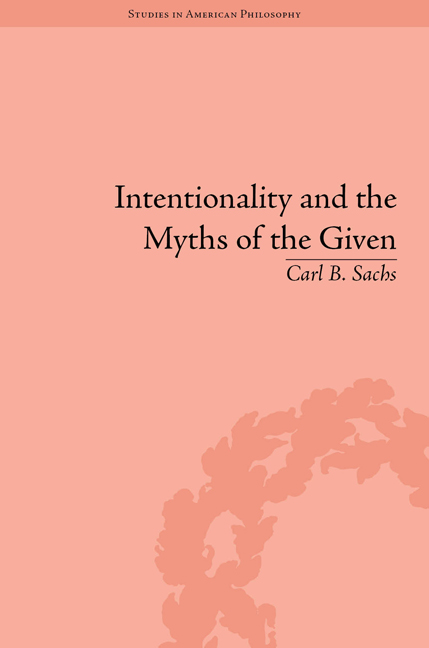Book contents
- Frontmatter
- Contents
- Acknowledgements
- Introduction: Why a New Account of Intentionality?
- 1 Intentionality and the Problem of Transcendental Friction
- 2 The Epistemic Given and the Semantic Given in C. I. Lewis
- 3 Discursive Intentionality and ‘Nonconceptual Content’ in Sellars
- 4 The Retreat from Nonconceptualism: Discourse and Experience in Brandom and McDowell
- 5 Somatic Intentionality and Habitual Normativity in Merleau-Ponty's Account of Lived Embodiment
- 6 The Possibilities and Problems of Bifurcated Intentionality
- Conclusion
- Appendix: Is Phenomenology Committed to the Myth of the Given?
- Works Cited
- Notes
- Index
6 - The Possibilities and Problems of Bifurcated Intentionality
- Frontmatter
- Contents
- Acknowledgements
- Introduction: Why a New Account of Intentionality?
- 1 Intentionality and the Problem of Transcendental Friction
- 2 The Epistemic Given and the Semantic Given in C. I. Lewis
- 3 Discursive Intentionality and ‘Nonconceptual Content’ in Sellars
- 4 The Retreat from Nonconceptualism: Discourse and Experience in Brandom and McDowell
- 5 Somatic Intentionality and Habitual Normativity in Merleau-Ponty's Account of Lived Embodiment
- 6 The Possibilities and Problems of Bifurcated Intentionality
- Conclusion
- Appendix: Is Phenomenology Committed to the Myth of the Given?
- Works Cited
- Notes
- Index
Summary
In setting up the present project, I proposed the need for a new account of intentionality – what I call bifurcated intentionality. Two philosophically salient reasons motivated this account: the need to respond to Rosenberg's eliminativism about intentionality and the need to satisfy the demand for transcendental friction. In order to construct the account, I turned to resources drawn from C. I. Lewis, Sellars, Brandom, McDowell, and Merleau-Ponty. Throughout the goal was to show why we should think about intentionality in terms of both socio-linguistic norms and bodily habits. We need the first move – the Sellarsian move that explains our grasp on the concept of the intentionality of thought in terms of our grasp on the concept of the intentionality of language – in order to avoid the Myth of the semantic Given. But we need the second move – the Merleau-Pontyian move that introduces the new conception of intentionality located in bodily habits and ‘the Grip of the Given’ – in order to satisfy the need for transcendental friction more successfully than Lewis, Sellars or McDowell are able to. Moreover, this distinction allows us to preserve, in a modified form, a deep insight shared (thought in different ways) by both Sellars and Merleau-Ponty: that we should reject the sensory-cognitive continuum
I now aim to pull together the disparate threads at work here to show in more detail how the account of bifurcated intentionality works and how it resolves two of the major debates considered here: McDowell's criticism of Sellars, and Dreyfus's criticism of McDowell.
Information
- Type
- Chapter
- Information
- Intentionality and Myths of the GivenBetween Pragmatism and Phenomenology, pp. 131 - 154Publisher: Pickering & ChattoFirst published in: 2014
